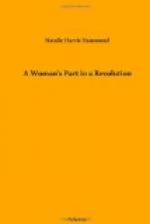By my Journal I see how good was Mr. Seymour Fort and how faithful Mr. Manion, the American Consular Agent, during this time of trial. From the flat of my back I listened to and took into consideration many plans suggested for the liberation of my husband. One lady proposed getting up a petition, which she would take to England to the Queen. It was to be headed with my name, as wife of one of the leaders: Mrs. Lionel Phillips being in Europe, and Mrs. George Farrar at the Cape; Colonel Rhodes a bachelor. I had small hopes of the success of things which had to be sent to Court, or placed before Courts. The subject was dismissed.
Then there was another plan thought out by a very shrewd man, and brought to my bedside, ‘news which concerns your husband’ being a passport to any one. I was to go at once to Cape Town, see Mr. Cecil Rhodes, and demand one hundred thousand dollars from him.
‘What for?’ I asked.
‘You see,’ said the gentleman, ’your husband and those other men are going to be tried sure, and we need money to lobby Pretoria.’
I was stupid—it was my first Revolution—and I hadn’t the least idea what lobbying Pretoria meant. My friend gave me a sketchy view of its meaning, and assured me it was usually done in grave cases.
’But it will kill me to leave my bed and start for Cape Town to-morrow,’ I exclaimed.
My adviser delicately hinted that my husband’s life was of more value than my own. On this point we agreed. I was to make Mr. Rhodes understand that we didn’t want any more ’tom-fool military men up here to ball up the game.’
He was to give the money to me unconditionally, to be disbursed as my friend saw fit. We rehearsed the part several times; I was hopelessly dull!
‘And now,’ he questioned, ’if Rhodes refuses to give you the money, what will you do?’
I thought of Jael and Charlotte Corday, and all the other women who had to do with history, and said, ‘I suppose I’ll have to shoot him.’
My preceptor looked discouraged. We went over the part once again.
It is but fair to say that he had made every provision for my comfort. Attendants were ready, and at the right moment I have no doubt but that a neat pine coffin could have been produced. Reflection, however, showed me the inadvisability of this project; but I was happily spared the embarrassment of drawing back from promised compliance.
There was a higher power ruling. The next morning’s papers announced the sailing of C.J. Rhodes for England.
The morning of January 10th, Johannesburg disarmed, and the Reformers in prison, the President of the Transvaal Republic issued a proclamation offering pardon to all who should lay down their arms, and declaring them to be exempt from prosecution on account of what had occurred at Johannesburg—’with the exception of all persons or bodies who may appear to be principal criminals, leaders, instigators, or perpetrators of the troubles at Johannesburg and suburbs. Such persons or bodies will justify themselves before the legal and competent Courts of this Republic’




